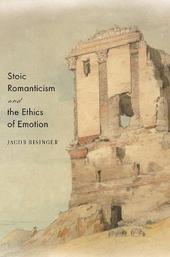
|
Stoic Romanticism and the Ethics of Emotion
Hardback
Main Details
Description
An exploration of Stoicism's central role in British and American writing of the Romantic period Stoic philosophers and Romantic writers might seem to have nothing in common: the ancient Stoics championed the elimination of emotion, and Romantic writers made a bold new case for expression, adopting "powerful feeling" as the bedrock of poetry. Stoic Romanticism and the Ethics of Emotion refutes this notion by demonstrating that Romantic-era writers devoted a surprising amount of attention to Stoicism and its dispassionate mandate. Jacob Risinger explores the subterranean but vital life of Stoic philosophy in British and American Romanticism, from William Wordsworth to Ralph Waldo Emerson. He shows that the Romantic era-the period most polemically invested in emotion as art's mainspring-was also captivated by the Stoic idea that aesthetic and ethical judgment demanded the transcendence of emotion. Risinger argues that Stoicism was a central preoccupation in a world destabilized by the French Revolution. Creating a space for the skeptical evaluation of feeling and affect, Stoicism became the subject of poetic reflection, ethical inquiry, and political debate. Risinger examines Wordsworth's affinity with William Godwin's evolving philosophy, Samuel Taylor Coleridge's attempt to embed Stoic reflection within the lyric itself, Lord Byron's depiction of Stoicism at the level of character, visions of a Stoic future in novels by Mary Shelley and Sarah Scott, and the Stoic foundations of Emerson's arguments for self-reliance and social reform. Stoic Romanticism and the Ethics of Emotion illustrates how the austerity of ancient philosophy was not inimical to Romantic creativity, but vital to its realization.
Author Biography
Jacob Risinger is assistant professor of English at Ohio State University.
Reviews"[A] useful book. . . . Risinger's explanations of the importance of Stoicism in the period's literature make a valuable contribution to the literature of the Romantic period." * Choice Reviews * "Stoic Romanticism and the Ethics of Emotion is a sustained and sensitive engagement with a range of literary work that shows the nuances of changing perspectives in a changing world. It is no small feat that virtually every sentence is a triumph of craftsmanship, or that the text reads with a confidence and ease found usually in the most seasoned critics."---Denise Gigante, Nineteenth-Century Literature
|